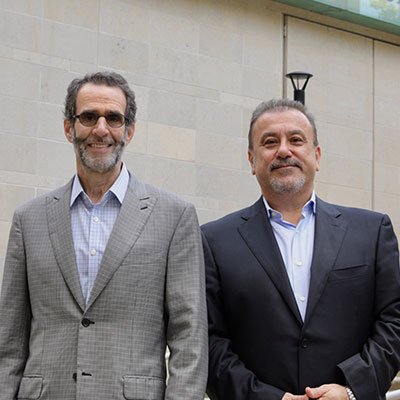UTHealth Houston recruits star investigator team to expand clinical and outcomes research

UTHealth Houston has recruited two renowned scientists from Cleveland Clinic to bolster clinical research across the institution.
Daniel Sessler, MD, the most published and cited scientist in any field at Cleveland Clinic, will serve as the inaugural vice president for clinical and outcomes research, and his colleague of 25 years, Alparslan Turan, MD, will direct a new Center for Outcomes Research. Both will also serve as professors of anesthesiology.
“Drs. Sessler and Turan are the best clinical researchers in anesthesia, and among the very best worldwide in any field,” said Kevin A. Morano, PhD, senior vice president for academic and faculty affairs.
In this new position, Sessler aims to expand clinical research across UTHealth Houston by participating in and coordinating institution-wide efforts in outcomes research. Through his work with the leadership team, Sessler will encourage collaboration and guide initiatives to support clinical research and grow the UTHealth Houston clinical trial portfolio.
Turan will establish a clinical Outcomes Research Center that will support clinical research throughout UTHealth Houston. The center’s mission is to provide expertise and personnel who will conduct large-scale research that addresses clinically important questions and improves patient care. The center will conduct all types of clinical research, with a special focus on large-scale clinical trials that enroll thousands to tens of thousands of patients — thus providing reliable guidance for clinicians.
“UTHealth Houston is already a world-leading basic science institution. Our goal is to make it equally prominent in clinical research,” Sessler said.
Sessler attended medical school at Columbia University in New York City and subsequently completed pediatric and anesthesia residencies at the University of California, Los Angeles. He has published more than 1,000 full papers, including three dozen in the New England Journal of Medicine, Lancet, and JAMA. His papers have been cited 70,000 times in peer-reviewed articles per Scopus, making him the world’s most published and cited perioperative investigator (H-Index 126).
Sessler has been a principal or co-investigator on grants totaling $100 million. He founded and directed the Outcomes Research Consortium 34 years ago. The consortium is the world’s largest anesthesia research group and publishes a full paper every other day. He served as the Michael Cudahy Professor and Chair at Cleveland Clinic for 19 years.
Turan graduated from medical school at Gazi University and did his anesthesia residency at Trakya University, both in Turkey. At Cleveland Clinic, he served as program director for the Clinical Research Fellowship and vice chair to the Department of Outcomes Research and General Anesthesia. He is the associate director of the Outcomes Research Consortium. He is also editor-in-chief of the Journal of Clinical Anesthesia. Turan’s grants total more than $15 million, and he has published more than 350 full papers. His main interests are perioperative outcomes, postoperative pain, regional anesthesia, and persistent surgical pain.
The focus for both investigators is trials that immediately improve care. When Sessler became an anesthesiologist, surgical patients were allowed to cool during surgery — and usually woke up shivering and feeling miserably cold. In a landmark series of several hundred papers, he showed that anesthetic drugs prevent normal temperature control which causes surgical patients to become hypothermic. He also demonstrated that hypothermia in surgical patients causes many serious complications. As a result of his work, all surgical patients are now kept warm.
More recently, Sessler has focused on cardiac injury during and after surgery, showing that it is far more common than generally thought. The reason is that most injury does not cause classic symptoms of a heart attack, such as chest pain and shortness of breath. Consequently, injury is usually missed unless detected with a special blood test. Despite the lack of symptoms, cardiac injury is the leading cause of death after surgery. Sessler’s work has led to routine testing for cardiac injury and clinical strategies for preventing injury.
Turan’s focus is reducing pain after surgery. Surgical patients justifiably fear pain since poorly managed pain can be intense. Acute surgical pain also leads to various complications, including chronic pain and persistent opioid use. Turan has formally tested dozens of peripheral nerve blocks and has identified ones that provide safe and highly effective pain relief. Because of his work, peripheral nerve blocks, which used to be rare, are now routine. Consequently, many fewer surgical patients experience intense postoperative pain than in previous decades.
“The recruitment of Dr. Sessler and Dr. Turan is transformative for outcomes research in the Department of Anesthesiology, Critical Care and Pain Medicine, as well as for UTHealth Houston,” said Holger Eltzschig, MD, PhD, chair of the Department of Anesthesiology, Critical Care and Pain Medicine; John P. and Kathrine G. McGovern Distinguished University Chair. “Through their Center of Outcomes Research, they will conduct the most important and cutting-edge clinical trials in anesthesiology, critical care, and perioperative medicine. They also will be transformative for our institution by training the next generation of physician-scientists in outcomes research. Moreover, their work will provide the platform for additional research support from federal and private funding sources. The addition of these scientists builds upon the great research momentum achieved by so many of our faculty.”